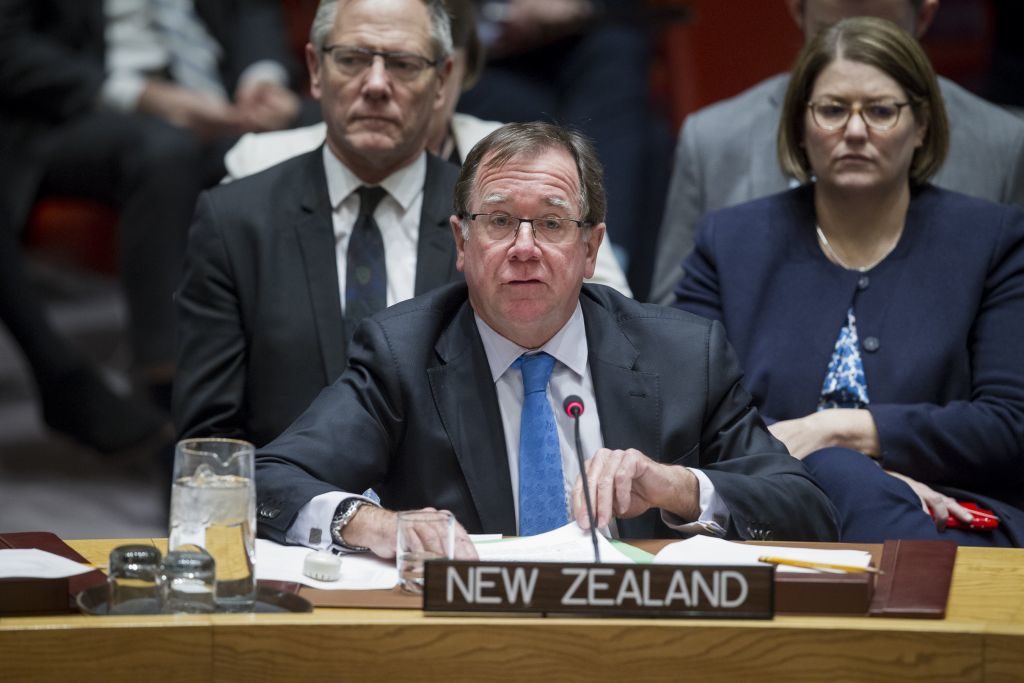Australia/Israel Review
AIR New Zealand: UNSC 2334 shockwaves
Mar 2, 2017 | Miriam Bell

United Nations Resolution 2334 came screaming out of the blue, just before Christmas. The “anti-settlement” resolution itself, which passed after the US broke with convention and abstained, was disturbing enough. But for Jewish New Zealanders it was particularly shocking.
This was because New Zealand, in its last days as a member of the Security Council, co-sponsored the resolution with Venezuela, Malaysia and Senegal. The move came after a similar resolution was withdrawn days earlier following pressure from Israel and US President-elect Donald Trump.
New Zealand’s Foreign Minister Murray McCully said New Zealand voted for and co-sponsored the resolution because it is consistent with long-held New Zealand policy positions on the Palestinian question. This position has subsequently been supported by new Prime Minister Bill English and Labour Party leader Andrew Little.
But the co-sponsorship and accompanying words felt like a betrayal to many in New Zealand’s Jewish community. And that feeling of dismay was made worse because McCully’s move has damaged the diplomatic relationship between Israel and New Zealand. Following the resolution’s adoption, Israel immediately recalled its ambassador to New Zealand.
Zionist Federation of New Zealand president Rob Berg said the resolution means Palestinians have no motivation to enter into direct talks with Israel as they can have their cake and eat it; “They can continue their campaign of hate and terror and refusing to acknowledge the Jewish connection to the land of Israel, while expecting to be given all [that] they are publicly asking for.”
McCully’s role in co-sponsoring of the resolution also put New Zealand in the same category as two of the most antisemitic nations, Venezuela and Malaysia, he said, calling them, “Two countries with appalling human rights records that New Zealand should not in any way want to be aligned with on such matters!”
Berg said that while the Embassy of Israel is still open, not having the ambassador is a big blow for the community and, more importantly, for Israel-New Zealand relations. “Without some acknowledgement by the New Zealand government of the calamitous mistake they made in co-sponsoring the resolution, it is difficult to see how diplomatic relations can improve and how the ambassador can return. The ball is in the court of the New Zealand Government.”
Former honorary Israeli consul David Zwartz agreed that the Israel-New Zealand relationship has been damaged. He said the co-sponsorship of resolution 2334 was a betrayal of balance and of values by McCully and the withdrawal of Israel’s ambassador was understandable.
“New Zealand’s longstanding policy of ‘even-handedness’, supported by both National and Labour governments, was thrown aside by UNSC 2334’s wording which named and blamed only Israel. McCully’s last-minute support for the resolution, in the company of countries that are outspoken opponents of Israel, has created a serious diplomatic break. It is up to New Zealand to repair it.”
The damaged relationship makes it harder to pursue growing business, scientific, cultural and tourism links between the two countries, he said. “Remembering the difficulties of the eight years (2002-2010) when there was no Israeli Embassy here, the Jewish community is doing all it can to help restore the status quo.”
In the aftermath of the resolution, there was a flurry of pro and anti-resolution activity in both the traditional media and on social media. A particularly disturbing aspect of this was a noticeable increase in antisemitism, sometimes cloaked as anti-Zionism, on social media.
NZ Jewish Council spokesperson David Cumin said there was an increase in comments on social media which included denial of the Holocaust as well as expressing wishes for another. “There were also some threatening emails sent to community groups and some mainstream media articles and letters published which crossed from legitimate criticism into hateful conspiracy theory (or worse).”
Additionally, Berg pointed out that a group of academics, described by the New Zealand Herald as “leading academics on conflict resolution and Israel-Palestine” but which included some dance professors, published an open letter to McCully saying that New Zealand should go further and boycott Israel. “This is a direct consequence of the resolution which has confirmed what we all suspected. Those who are anti-Israel have clearly been overjoyed by the resolution, which probably shows how anti-Israel it is,” Berg argued.
However, it is worth noting that there has also been a strong backlash against the resolution and New Zealand’s co-sponsorship of it by many outside the Jewish community.
The backlash included a rally of around 300 people outside parliament, a media and advertising campaign led by Hawkes Bay pastor Nigel Woodley, a petition urging that the Israeli Embassy remain in Wellington signed by nearly 2,500 people, and a broad-based letter and opinion piece writing campaign. Berg said he thought the depth of the backlash caught McCully by surprise and led to him feeling the need to justify his position in an opinion piece published in the Herald.
In recent weeks, the initial wave of anti-resolution comment has trailed off somewhat. But long-time pro-Israel advocate John McCormick said there was an intention to make Resolution 2334 a political issue in the lead up to the national election scheduled for September and that means there will be more action to come.
Tags: Australasia, Israel, Malaysia, New Zealand, United Nations






